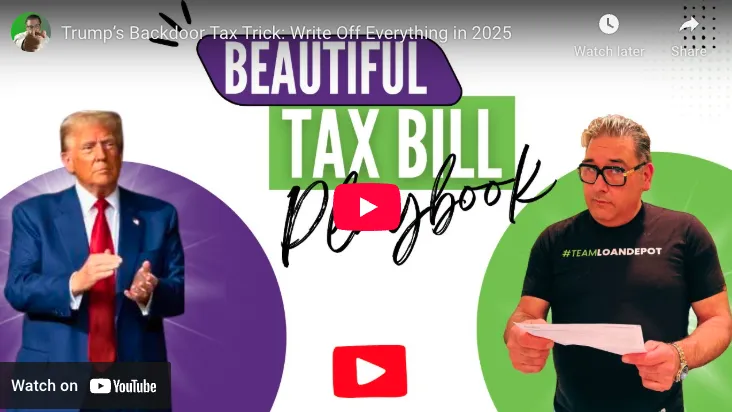
Trump’s Backdoor Tax Trick: Write Off Everything in 2025
While everyone argued online this Fourth of July about red vs. blue, something much more important happened behind the scenes—a major tax bill passed. And if you’re bold enough to invest in real estate or run a business, it could put tens of thousands of dollars back in your pocket.
This isn’t about politics. It’s about leverage. And the people who understand how to play the game are already building wealth while the rest watch from the sidelines.
Let’s break down what’s inside this so-called “Big Beautiful Tax Bill” and how you can start using it.
The IRS Wants to Pay You—If You Know the Rules
A few years ago, CPA Tom Wheelwright said something that changed the game:
“The tax code is just a series of incentives.”
The government literally pays you through deductions and credits to do things it wants done—like build housing, start businesses, create jobs, invest in underserved areas, and more.
This bill simply made those incentives even more powerful.
1. 100% Bonus Depreciation Is Back
This is the crown jewel. Bonus depreciation lets you deduct 100% of qualifying asset costs in year one—instead of spreading them out over years.
Let’s say you buy a $200,000 rental. Normally you’d deduct about $7,200 a year. But if you bring in a cost segregation expert who identifies 30% of the building as short-life property, you could deduct $60,000 immediately.
You still get rent, equity, and appreciation—but your taxable income drops drastically. That’s not a loophole. It’s written into the IRS tax code.
Learn more about bonus depreciation
2. Section 179 Write-Offs: The Overlooked Power Play
Section 179 lets you write off things you’re already buying to improve your properties:
HVAC systems
Appliances
Flooring
Solar panels
Smart locks and tech
Office gear (laptops, mics, desks)
Example: You rehab a property with $40,000 in upgrades. If you're in the 35% bracket, that’s $14,000 in real cash saved—this year.
Section 179 Deduction explained
3. Business Vehicle Deductions
Vehicles over 6,000 pounds used at least 50% for business—like a Mercedes G-Wagon, Ford Raptor, or Sprinter van—qualify for a full deduction in year one.
That’s a $90,000 write-off. Just don’t fudge the mileage log—this one’s real but needs documentation.
4. Opportunity Zones 2.0: A Capital Gains Hack
Sell crypto or stocks and made a big gain? Roll that money into an Opportunity Zone Fund, and you can:
Defer your capital gains until 2026
Reduce the tax owed
And best of all, eliminate all future gains if you hold the property for 10 years
This is how a $2M building turning into $4M could leave you with a $2 million tax-free gain.
Explore the HUD Opportunity Zones map
5. QBI Deduction for Business Owners
Own rental property through an LLC or partnership? You might qualify for the 20% Qualified Business Income (QBI) deduction, reducing your tax bill just for having the right structure.
$100,000 in rental income could get taxed like $80,000. That’s a $20,000 deduction just for setting up properly.
6. SALT Cap Increased
If you live in a high-tax state like California or New York, you’ve likely been limited to a $10,000 deduction on state and local taxes (SALT). That cap just jumped to $40,000 for households making under $500,000.
That’s a long-overdue update, and it’s putting $10–14K in potential tax savings back into the pockets of real people.
7. The 37% Tax Rate Is Now Permanent
High earners were expecting the top tax rate to rise from 37% to 39.6%. But the bill locked it in at 37%—possibly for good. That means more certainty and more time to plan strategically.
Final Thoughts: Your Window Is Now
This bill doesn’t just change your taxes—it changes the game. But it’s not permanent. Many of these provisions expire in 2026 or 2029, which means the timer is already running.
If you want to build wealth, now is your moment.
Your Action Plan:
Get a proactive CPA, not a tax preparer
Identify assets or gains you can reposition
Search for deals in Opportunity Zones or bonus depreciation-friendly properties
Make your business purchases count this year
This isn’t about scamming the system. It’s about finally learning to play it. The rules are written. The IRS literally publishes them.
The question is: Are you going to keep watching, or are you ready to run the play?


